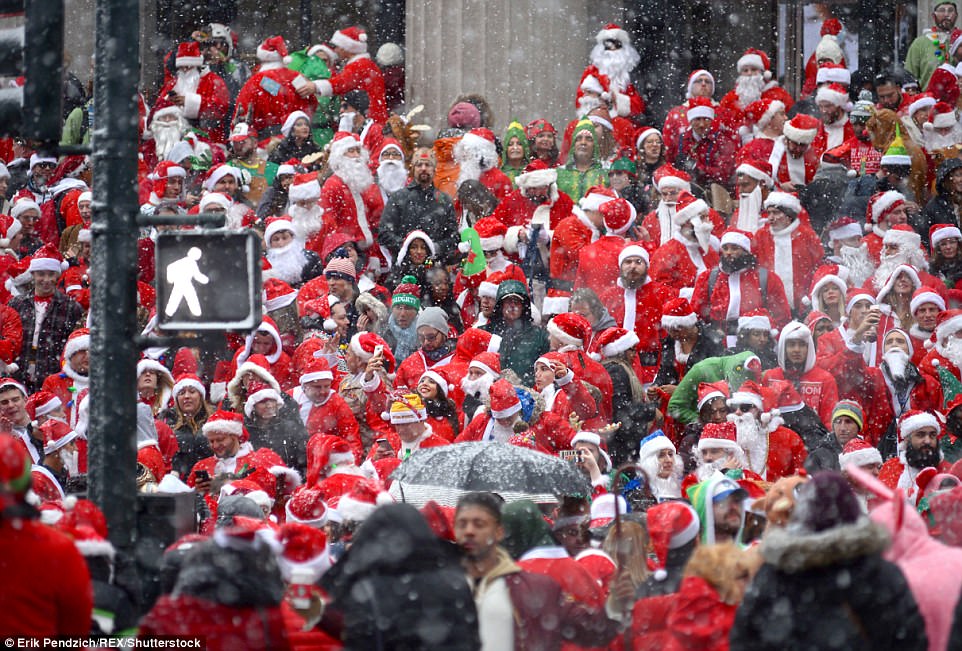
‘Tis the season of Yule: a season that has become, for many, filled with nihilistic self-debauchery set to the fraudulent timing of Jesus’s birth.
Yay.
It’s bad enough that we feel powerless amid a cascade of moral, political and cultural ambiguity of the last few years, but this time of year there is a delirious “Party On” wave as well. Whether a Wiccan Yule or a Hipster SantaCon, the Solstice Season doubles these days as a kick-off for our latent human cynicism amid Christmas. Maybe part of all the ennui is the simple truth that Christmas is not really a birthday, it’s the time of ancient celebration of growing daylight, lo these millennia.

Christmas, the Virgin Birth-ing day of Jesus, was first celebrated 300 years after that event, and in truth had nothing to do with it. The “War On Christmas” was actually the “War on Winter Solstice” a couple of millennia ago. Humans were already celebrating long before Mary and Joseph were looking for a room. Clearly, pre-history humans had a lot of time on their hands to expound on what they could observe when they weren’t hunting and gathering.
Absent the the Internet, or even TV, our ancestors may have died young but they still had a few decades of unformatted thinking to apply to what they saw. The natural world became Allegory Central: Stars became constellations, places like Stonehenge were built at great effort as the First Internet, the enveloping biosphere and distant visually present universe was, literally, a natural fixation where direct observation transitioned to subjective definition with no other data applied. Tilted as the earth’s spinning is, we have never-ending variation in the most basic metronome of all life – day and night.
When the sun stayed around longer just enough to be noticeable without a pocket watch, people reveled in the natural salvation from the cold and dark. When gathering gave way to farming, harvest focused on the end of a season of focused effort. Celebration was natural. When early Christians wanted to carry out the Great Commission of telling every soul in northern Europe about the person who changed everything a few centuries prior, they thought nothing of co-opting that existing Yule celebration into their message – first in the liturgical ritualization of Advent, but ultimately in declaring that the Savior just happened to be born at about the same time as the feasts that were already part of the Pagan calendar. Voila: Natural, cultural and religious synergy melded in branding and marketing of the Good News.
Given Christmas’ disingenuous underpinnings of moving a Birthday Party to the dead of winter from a date that probably happened sometime in the spring it should not be surprising that the rest of the secular world ultimately grabbed onto that celebration to make money. But recently it’s become more egregious. According to Pew: “there has been a noticeable decline in the percentage of U.S. adults who say they believe that biblical elements of the Christmas story – that Jesus was born to a virgin, for example – reflect historical events that actually occurred.” The growing cynicism has birthed a New Age of self-abuse ick at Holiday Time.

Whether it’s SantaCon or Mad Friday, the same folk dubbed “The Young Invincibles” by the healthcare industrial complex have few of the childcare, mortality or career concerns that tend to pre-empt mind-numbed bacchanalia. “If it feels good, do it,” was not invented in the ’60’s, and it’s clearly invigorated as a lifestyle choice in the Holidays.
Transformative interpretations are part of who we are. The emerging cynicism about anything offered up without a YouTube video to back it up renders the miracle of the Baby Jesus less evocative for a growing number than the natural phenomenon of the Winter Solstice. When Santa Claus has a higher Q rating than Christ or the Higgs particle, the triumph of marketing over faith is as fresh now as it was 1700 years ago when Christmas was born.
History may be warped at Christmas to conflate the Virgin Birth and Solstice, but the result has a message. The early evangelical effort helps us see a Light that our eyes cannot. Like Santa Claus for children, Christmas is just a platform for giving. Without it, the saints may still be devotional, but the rest of us would find very good reasons not to put the extra lump of coal in the stove to warm the office.
We need constructions to free our latencies – Karaoke to sing, Weight Watchers to lose fat, and, for many of us, Christmas to do unnecessary acts of love. If we had confidence in our righteousness we could spontaneously sing, always have a perfect BMI, and love our neighbor 24/7. Without some provocation we can sit in our caves and curse the darkness. But each of us has a birthday that we had nothing to do with, other than fulfilling a miraculous coincidence of science and hope in birth. But we instinctively hold onto our birthday as a point of essential humanity.
Extending the hope of each human birthday into the world sounds a lot more like Christmas than the Winter Solstice – and that’s a good thing.

COMMENTS
Leave a Reply












